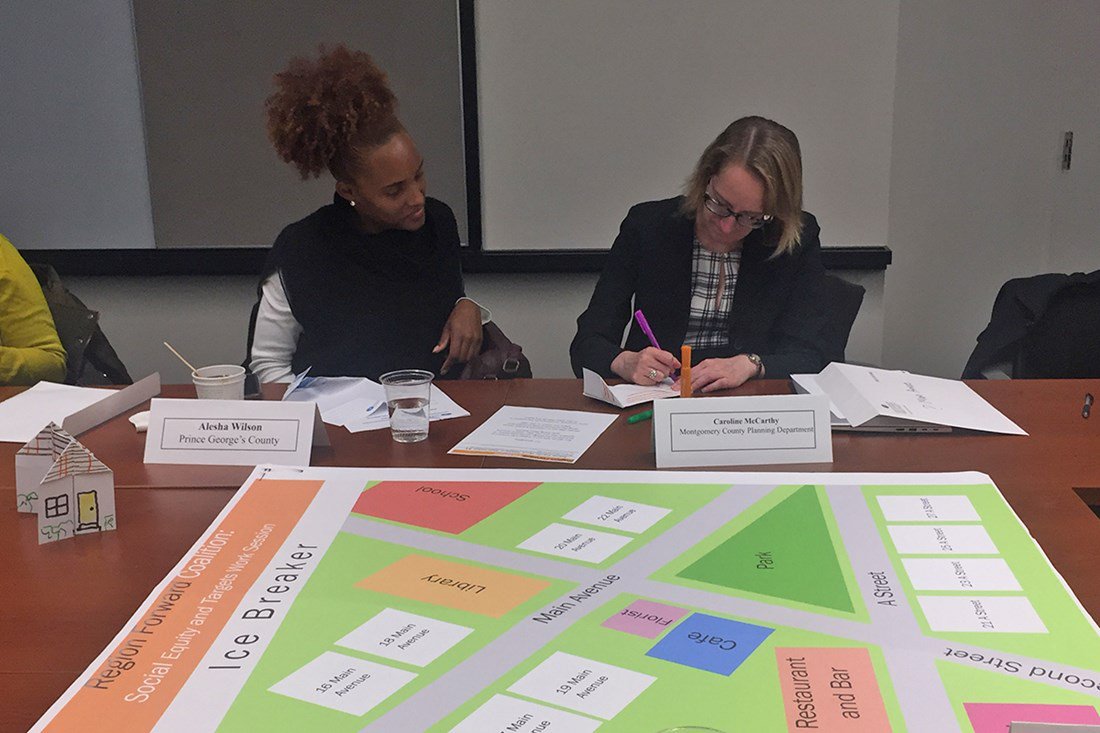When local government officials and their agency staff walked into a special COG work session in November, they were given an unusual request: pick a partner and join COG staff in a few minutes of arts and crafts.
The instructions? Build a miniature house out of the materials you have in front of you.
One councilmember was given paper, markers, tape, and instructions for constructing his house.
Another county board member was given just a torn piece of paper and a crayon.
Not surprisingly, the officials’ creations turned out drastically different. Some of the miniature homes were solidly built and beautifully decorated, thanks to an abundance of supplies and directions.
Others were lucky if their creation was standing.
The lesson? Imagine a region where everyone was assured the opportunity to build their best life—“their home” in this exercise—and participate in and benefit from all that the area has to offer. This idea of dismantling barriers to success for all residents is just one of many ways to describe the concept of social equity, a key focus of leaders on the Region Forward Coalition (RFC) this year.

November work session on social equity (COG).
RFC leadership—Prince George’s County Council Member Dannielle Glaros, Falls Church City Council Member Marybeth Connelly, and District of Columbia Councilmember Robert White— initiated the special work session to consider how social equity can be weaved into the Region Forward Vision, shared goals endorsed by COG and its member governments in pursuit of a more prosperous, accessible, livable, and sustainable metropolitan Washington.
Weaving in Social Equity
Although the concepts of equity and inclusion are present in many of the existing Region Forward goals and targets, COG analyses point to unmet needs and vulnerable populations in the region.
During the work session, participants worked in small groups to draft language for a regional social equity goal and consider the best way to measure progress toward this goal.
Some of the improvements considered by the group include:
- Reduce income inequality
- Narrow the gap in life expectancy across Metro D.C.
- Incorporate social equity, cultural sensitivity, and community health considerations into local climate change planning, program, and policy decisions
Input received during the work session is currently being reviewed by RFC leadership and will be discussed with the coalition in January.
In the spring, the RFC’s findings and proposed amendments to the Region Forward Vision will be presented to the COG Board of Directors for its official endorsement, emphasizing the importance of equity and inclusion across all areas of planning, and in the region’s measure of its progress and prosperity.
Progress Toward the Region Forward Vision
The social equity work session capped off a year-long effort by the RFC to revisit all of the Region Forward goals and targets and review the region’s progress toward them. According to the latest estimates:
- The region is meeting all but one of its PROSPERITY targets, including wage growth, job growth, GRP growth, and attainment of both bachelor’s and advanced degrees, but hasn’t yet met its target for high school graduation rates.
- The region is meeting seven of its nine ACCESSIBILITY targets, including capturing new growth in and linking regional activity centers, reducing vehicle miles per capita, and increasing walking, biking, and transit trips. Most, but not all of the activity centers have transit access. The region hasn’t yet met its target commercial construction growth in activity centers but is forecast to meet its goal in the future.
- The region is meeting five of its seven LIVABILITY targets, reducing the number of residents that are housing cost-burdened, reducing violent property crimes, increasing access to crime data and emergency alerts, and improving health and quality of life of all residents. The region hasn’t yet met its target for reducing pedestrian and bicycle fatalities, and reducing the percentage of residents living in high poverty tracts.
- The region is meeting half of its SUSTAINABILITY targets in this category, including green building construction, water quality goals, and maintaining land for agriculture, but hasn’t yet met its targets for air quality and greenhouse gas emissions reductions—though significant progress has been made in these areas—and conserving green space.
MORE: Region Forward: Measuring Progress